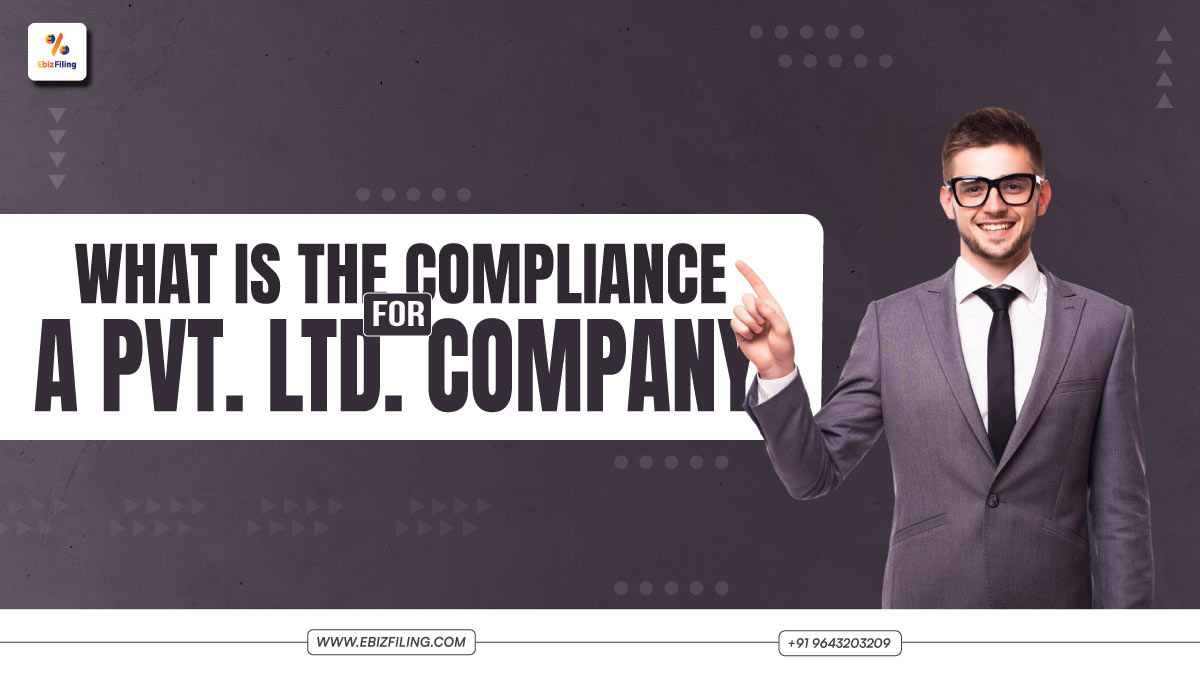What is Compliance and Why It Matters?
Compliance means adhering to all the legal rules and procedures applicable to a business under Indian laws. For a Pvt. Ltd. Company, compliance is essential to remain legally operational and avoid penalties.
Importance of compliance:
- Legal Protection: Keeps your company safeguarded from legal actions.
- Investor Readiness: Makes the company attractive to investors and banks.
- Reputation Management: Builds credibility in the eyes of stakeholders.
- Long-term Sustainability: Ensures smooth functioning and scalability.
ROC Compliance under Companies Act, 2013
a) Post-Incorporation Compliances
These are initial steps required immediately after incorporation:
- First Board Meeting: To be held within 30 days from incorporation to appoint the Chairman, approve the auditor, and adopt preliminary documents.
- Statutory Auditor Appointment (ADT-1): Must be filed within 15 days from the auditor appointment.
- Bank Account & Share Allotment: Open a bank account and allot shares to subscribers within 60 days.
- Filing INC-20A (Commencement of Business): Mandatory before beginning any business activities, to be filed within 180 days.
b) Annual Compliance
These filings are mandatory for all registered Pvt. Ltd. Companies annually:
- Holding Board Meetings: Minimum four per year with a maximum gap of 120 days.
- Annual General Meeting (AGM): Must be conducted within six months of financial year-end.
- Filing of AOC-4: To submit financial statements within 30 days of AGM.
- Filing of MGT-7: To submit annual return within 60 days of AGM.
- Director KYC (DIR-3 KYC): To be filed by all directors annually by September 30.
- Return of Deposits (DPT-3): Must be filed by June 30 every year.
- Disclosure of Interest (MBP-1): Directors must disclose interest at first Board Meeting every year.
- MSME Form I: Filed for delayed payments to MSME vendors on a half-yearly basis.
- BEN-2: If there’s any Significant Beneficial Owner in the company.
c) Event-Based Compliances
These arise whenever specific changes occur in the company structure or operations:
- Change in Directors (DIR-12): Filed within 30 days of the change.
- Change in Registered Office (INC-22): Must be filed within 15–30 days depending on the type of change.
- Increase in Authorized Share Capital (SH-7): Required before issuing new shares.
- Charge Creation or Modification (CHG-1): Filed within 30 days.
- Special Resolutions (MGT-14): Needed for actions requiring shareholder approval.
Tax and Statutory Compliances
a) Income Tax Act
- PAN & TAN Application: Must be obtained after incorporation.
- Filing ITR (Form ITR-6): To be filed annually by Pvt. Ltd. Companies.
- Tax Audit (if applicable): Required if turnover exceeds Rs. 1 crore (Rs. 10 crore for digital transactions).
- Advance Tax Payments: Applicable if tax liability exceeds Rs. 10,000.
- TDS/TCS Compliance: Timely deduction and quarterly return filing is mandatory.
b) GST Compliance
- GST Registration: Mandatory if turnover exceeds Rs. 40 lakh (goods) or Rs. 20 lakh (services).
- Monthly/Quarterly Filings: GSTR-1, GSTR-3B based on turnover.
- Annual Return (GSTR-9): Compulsory for registered businesses.
- GST Audit: Required if turnover exceeds Rs. 5 crore.
c) Other Statutory Compliances
- Professional Tax Registration: Applicable in certain states.
- ESI & PF Registration: Mandatory if employee count exceeds prescribed limits.
- Shops & Establishment Registration: Depending on the state laws.
- Labour Identification Number (LIN): Issued by Shram Suvidha portal for labour law compliance.
Penalties and Consequences of Non-Compliance
| Nature of Default | Consequence |
| Delay in AOC-4/MGT-7 filing | Rs. 100/day per form without any ceiling |
| Failure to hold AGM | Penalty up to Rs. 1 lakh plus Rs. 5,000/day |
| Non-filing of DIR-3 KYC | Director marked as disqualified |
| Non-compliance with GST laws | Heavy fines, interest, and cancellation |
| Ignoring TDS deductions | Interest @1%-1.5% per month and penalty |
| Violation of labor laws | Inspections and criminal prosecution are possible |
Benefits of Being Compliant
- Enhanced Credibility: Attracts investors and builds trust with stakeholders.
- Legal Protection: Avoids penalties and regulatory scrutiny.
- Ease of Funding: Financial institutions prefer compliant businesses.
- Business Expansion: Licensing and approvals are easier.
- Peace of Mind: Ensures business stability and operational smoothness.
Step-by-Step Compliance Checklist
Post-Incorporation
- Hold First Board Meeting
- File INC-20A, appoint Auditor (ADT-1)
- Open Bank Account and issue Share Certificates
Monthly/Quarterly
- File GST Returns (GSTR-1, GSTR-3B)
- Deduct TDS, file TDS returns
- Pay Advance Tax (if applicable)
Annually
- Conduct AGM
- File AOC-4 and MGT-7
- Director KYC (DIR-3 KYC)
- MSME and DPT-3 Filing
Event-Based
- File forms for director change, capital increase, office change, etc.
Real-Life Example
A Pune-based Pvt. Ltd. company forgot to file its DIR-3 KYC for two of its directors by the due date. As a result, both directors were marked “disqualified” on the MCA portal and could not approve company resolutions. The issue was resolved only after paying the penalty and completing the overdue filing.
Tips to Stay Compliant
- Compliance Calendar: Use a digital calendar to track all filing deadlines.
- Expert Help: Involve CS and CAs to manage complex legal tasks.
- Stay Updated: Regularly check mca.gov.in, incometax.gov.in, and gst.gov.in.
- Automate Returns: Use filing software to automate GSTR or TDS returns.
- Document Readiness: Maintain updated registers, resolutions, and compliance proofs.
How EbizFiling Can Help
- Compliance Filing: Timely ROC, ITR, GST, and labor filings with reminders and expert follow-ups.
- Post-Incorporation: Assistance with opening bank accounts, INC-20A, share certificates, ADT-1.
- Event-Based Filing: Handle all MCA forms for structural or directorial changes.
- Labor Law Help: ESI, PF, Professional Tax, and Shops Act registration as per threshold.
- Advisory & Support: Dedicated experts to guide you with real-time updates and compliance alerts.
Conclusion
Maintaining compliance for a Pvt. Ltd. Company in India is not optional, it’s essential. From ROC filings to GST, tax and labor laws, following timely and accurate procedures helps your business stay legal and grow without obstacles. Staying compliant protects you from penalties, disqualifications, and builds long-term business value.
Suggested Read :
How to Close Pvt Ltd company in India?
Compliance Obligations for Pvt ltd Companies
Calculate Valuation of a Pvt Ltd Company
Monthly Compliance Requirements for Pvt ltd Companies
Statutory Audit For Pvt Ltd Company











December 17, 2025 By Steffy A
Private Limited Annual Filing: Notes and Documents Checklist Important Notes for Private Limited Annual Filing The professional fees mentioned are exclusive of penalties and taxes, if any. DPT-3 (Return of Deposits) is not part of the standard package, as applicability […]
January 30, 2026 By Dhruvi D
ROC Annual Compliance Calendar for Pvt Ltd Company FY 2024-25 Introduction Missing any ROC due date can lead to penalties, late fees, and loss of active company status. Every Private Limited Company must comply with statutory timelines under the Companies […]
November 4, 2025 By Dhruvi D
Tax Audit for Private Limited Companies : Rules, ICAI Guidelines, and Extended Due Date Introduction A Tax Audit ensures that the financial statements of a Private Limited Company meet the requirements of the Income Tax Act. It becomes mandatory under […]